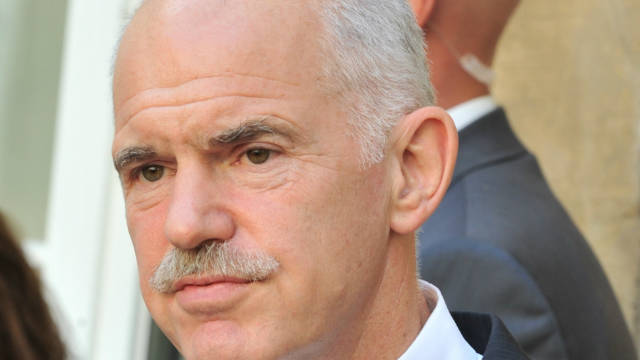
Berlin (CNN) -- Greek Prime Minister George Papandreou "can guarantee that Greece will live up to all its commitments," he said Tuesday as he seeks to keep his debt-ridden country afloat.
"I promise you we Greeks will soon fight our way back to growth and prosperity," he told an audience of German business leaders in Berlin before a critical meeting with the country's Chancellor Angela Merkel.
Papandreou was speaking as Greece braced for strikes in the face of government efforts to raise taxes and slash spending to try to close its huge budget deficit.
World markets rose Tuesday as investors grow more optimistic about resolving Europe's debt crisis.
Meanwhile, a property tax measure passed the Greek parliament in Athens late in the day, as more than 2,000 demonstrators gathered outside in Syntagma Square and police manned barricades in case of trouble.
The tax is the latest in a series of austerity measures imposed by the Greek government in an effort to limit the country's huge debt.
Speaking alongside Papandreou, Merkel said she was opposed to more stimulus packages because creating more debt was not the way to create growth -- but that Germany would support Greece on its way out of its debt crisis.
She also pointed out that Germany profited from the euro, with some 60% of its exports going to European Union countries and that the nation's future depends on that of Europe.
However, solidarity and reform have to go together, the German leader said, and Germany would help Greece only if it did its part.
Merkel is hoping to win support from the public and members of her own governing coalition before a key vote in Germany's parliament Thursday on boosting the European Union rescue fund used to bail out Greece. If the measure passes thanks to the opposition rather than her own government, Merkel stands to lose face in Germany and will be a weaker figure on the European stage.
In a joint media conference held later Tuesday in Berlin, Merkel recognized the pain being felt by many people in Greece.
"I'm conscious of the fact that a lot of change is being imposed upon the people in Greece at the moment. That to a degree people who have absolutely nothing to do with the current debt crisis that has arisen, have to save and do without a lot at the moment," she said.
Papandreou said Europe was in uncharted waters but that Greece was resolved to do whatever was necessary to restore financial security.
Back in Athens, transport workers shut down buses and some metro lines as lawmakers voted through the new property tax. Taxi drivers are planning to join the strike later in the week.
Even as the strike took hold, Finance Minister Evangelos Venizelos told CNN "the Greek people are absolutely ready to accept very strong sacrifices" in order to re-establish national dignity and fiscal and financial independence.
Greece's stock market hit an 18-year low Tuesday, but most markets in Europe were up Tuesday on rumors that the European Central Bank was planning to increase the size of its rescue fund. The bank declined to comment on the rumor in response to CNN questions.
Urging Europe to give Greece more time to meet its commitments, Papandreou said: "This is not an investment in past failures, this is an investment in future successes."
He said European nations needed to "stop blaming each other" for economic and financial problems that are threatening the stability of their common currency, the euro.
"The eurozone must now take bold steps towards fiscal integration to stabilize the monetary union," he said at a meeting of the Federation of German Industries.
The Greek prime minister urged Europe to expand the emergency rescue fund known as the European Financial Stability Facility.
And he called for tighter enforcement mechanisms to keep individual countries from running the kind of budget deficits that have caused problems for Greece, and, by extension, the euro.
The European Union and the International Monetary Fund have poured money into Greece to keep it from defaulting on debts, fearing a default could have catastrophic consequences for the euro.
But the international organizations have demanded that Greece put its finances in order if it is to continue receiving future installments of the money it has been promised.
Japan floated the idea Tuesday that it, too, could contribute money to help Greece.
Finance Minister Jun Azumi said there was a "possibility Japan will share some of the burden" if agencies hammer out a "firm process and scheme with a reasonable amount of money that could provide the world market with a sense of security regarding a Greek bailout."
Unpopular belt-tightening measures have put Greece on track to achieve a primary budget surplus by the second half of 2012, Finance Minister Venizelos said in Washington Sunday.
He vowed that Greece would do "whatever it takes" to meet its financial obligations.
But he warned that measures have taken a toll on the Greek economy, which has been in recession for three years.
While the government in Athens remains committed to reforms, Venizelos argued that the nation's "sacrifices" should be matched by support from other euro area nations.
Greece has been in intense negotiations over the last few weeks with representatives from the International Monetary Fund, European Commission and European Central Bank. The talks have centered on certain fiscal targets Greece needs to achieve in order to obtain the next installment of last year's 110 billion euro bailout package.
Investors around the world have been rattled by the possibility that Greece could default if it does not receive the 8 billion-euro installment. The larger fear is that a default by Greece could drag down other euro area nations and cause a banking crisis.
 10:06 PM
10:06 PM
 specialshowtoday
specialshowtoday

 Posted in:
Posted in: 

0 comments:
Post a Comment